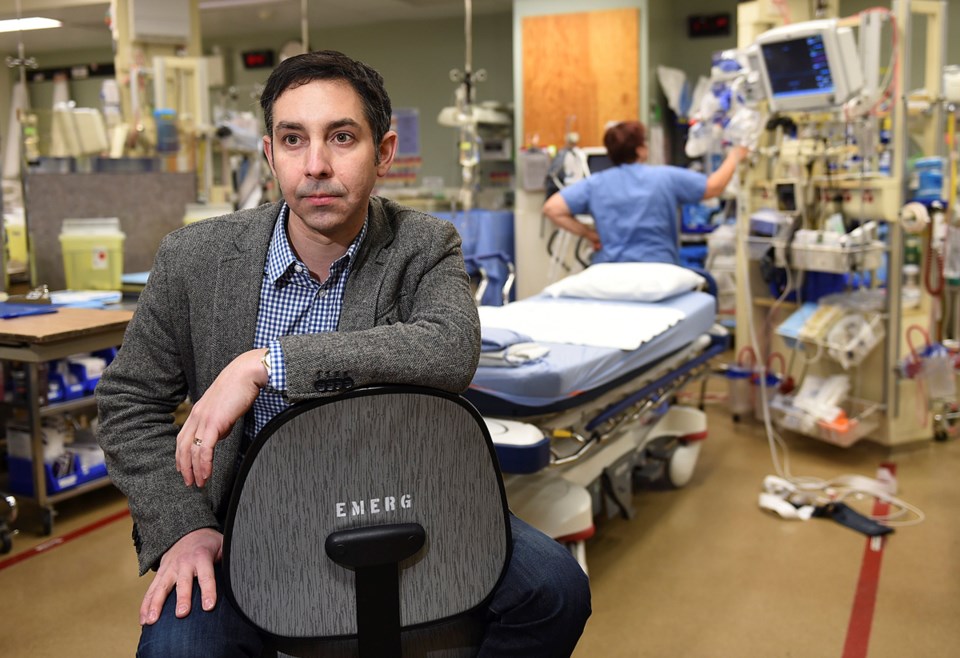His Leo Awards speak to his acumen as a filmmaker, but Kevin Eastwood is also a dealmaker of the highest order.
A case in point: a man arrives in the emergency room at Vancouver General Hospital (VGH) with his life hanging in the balance. Within minutes, Eastwood assesses the situation, gets consent to film the ailing man’s treatment and then documents one of the most traumatic days of the patient’s life.
That’s just another day at the office for Eastwood, who directed the wildly-popular Knowledge Network documentary series, Emergency Room: Life + Death at VGH.
The series finale airs Dec. 21 at Vancity Theatre, and the two featured episodes were filmed during the holiday season in 2015.
“People get caught up with some really trivial things at times during the holidays,” Eastwood said. “This show demonstrates that if it’s not a matter of life and death, then it’s something that’s not worth getting too stressed about.”
The ailing man in question — who underwent a liver transplant earlier that year — is featured in an episode set on Christmas Day. He ends up at VGH due to an extremely adverse reaction to the medication he was given, and his symptoms resemble those of a stroke. Eastwood saw the man admitted from afar and his storytelling sensibilities kicked in.
“I remember asking him how was feeling and he got choked up — I realized the magnitude of the situation and felt bad for asking such a stupid question,” the 40-year-old Vancouverite recalled. “But he felt really lucky too because after everything he had gone through, it made him appreciate what’s important. Here’s a guy who couldn’t talk properly and yet he could still find some silver lining.”
Those are the types of stories and narratives sprinkled throughout the series finale and the preceding two seasons. The breadth of emotions ranges from funny to horrifically sad, to quirky and heart pounding.
In Season 1 alone, the crew witnessed 22 people take their final breaths. They stopped counting before Season 2 started.
“[Hospital staff] see more death before 9 a.m. than most people see in their whole lives,” Eastwood said. “The fact that they come back to work the next day, let alone continue to do it for years on end, I find that remarkable.”
Another story highlighted in the finale follows the plight of a construction worker admitted to the E.R. on Christmas Eve. Before heading home to celebrate the night with his young family, he makes a pit stop at the hospital, albeit minus one of his fingers.
“He said he felt so lucky, in that he had been doing that job for 30 years and that his time was overdue for an accident like this,” Eastwood said. “Most people get frustrated over losing their keys or not getting to work anytime. This is a guy that just lost part of himself and he felt lucky. It was really inspiring.”
Getting buy-in from all parties to document their comings and goings wasn’t always smooth. At times, patients would oblige and the story was set in motion, only to have it scuttled on account of a hospital staffer not wanting to be filmed. In other instances, the circumstances were so severe or traumatic that Eastwood wouldn’t consider approaching the patient.
“It’s always a delicate balance — we get shot down a lot of the time and I certainly understand that because I’d probably say no,” Eastwood said. “I’ve been shocked more than anyone by how often people will say yes at what is sometimes the hardest moment in their life.”
During a break in filming Season 1 Eastwood himself got up close and personal with death’s door, after suffering a heart attack while in Los Angeles.
“This was after having filmed resuscitation after resuscitation,” he recalled. “I don’t remember my own resuscitation because I was unconscious, but I was able to pretty clearly visualize the scene that must have unfolded in the trauma bay where I was when people tore off my clothes, performed CPR and saved my life. It really de-stigmatized death for me.”
Filming for the documentary began in spring 2013 and Season 1 aired a year later. The original intention was for one season only, but viewers wanted otherwise: the inaugural season netted 1.2 million viewers, breaking previous Knowledge Network records. The show also won two Leo Awards that year for Most Popular Television show and Best Documentary.
“The main elements of storytelling involve some pretty high stakes and we’re a documentary with genuinely high stakes that people get engrossed in,” Eastwood said. “And because these people work in healthcare, they’re aware of being physically healthy, so they’re attractive, compassionate and smart people who are fun to spend time with.”
Tickets for the series finale range in price between $10 and $12 and the show is intended for viewers over the age of 19. For ticket info, see viff.org. Knowledge Network will broadcast the episodes on Feb. 21 and 28, 2017. For more information on the show, log on to www.knowledge.ca/er.


